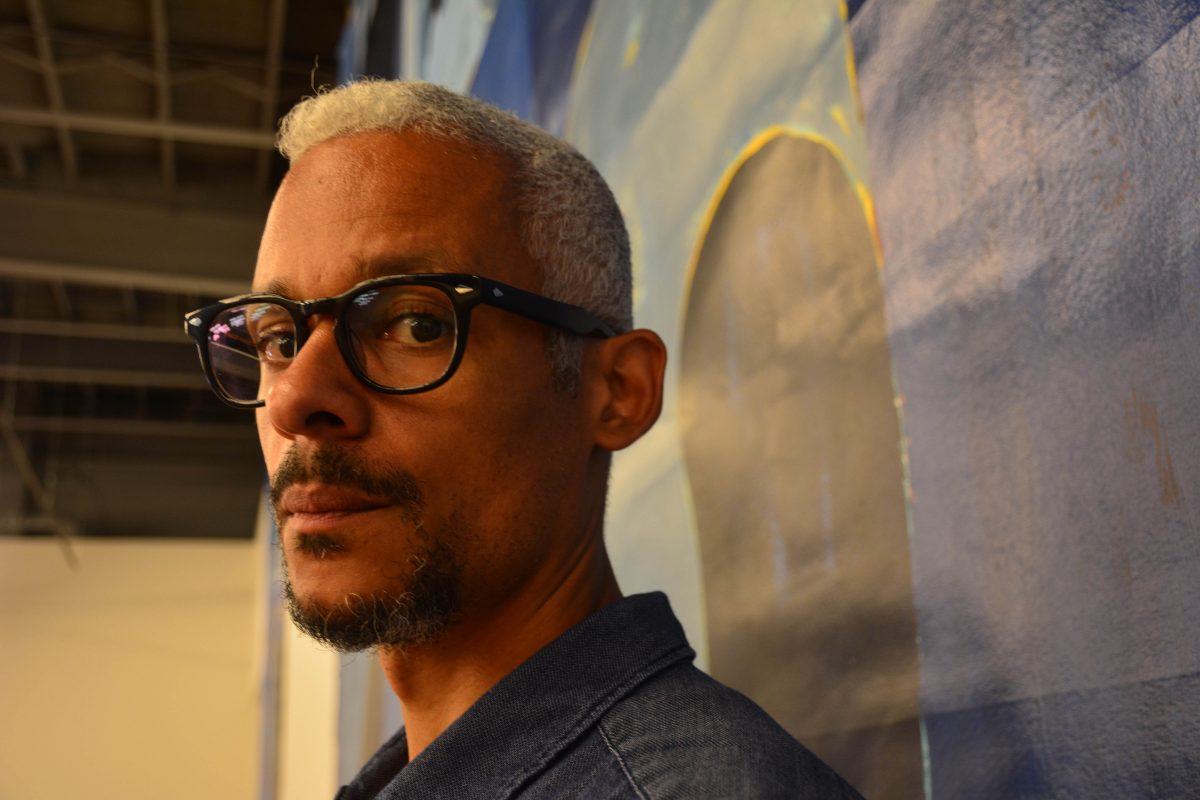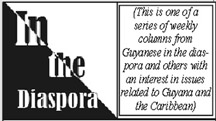Faizal Deen was born in Georgetown, Guyana. He immigrated as a child to Ottawa, Canada in 1977. He is the author of Land Without Chocolate, a Memoir (1999), the first published LGBTQ poetry collection written by a Guyanese-born poet.
The announcement Tuesday morning (May 19th) that Kaie Kellough had won Canada’s Griffin Poetry Prize—one of the most prestigious literary prizes in the world—for his mesmerizing poetry collection, Magnetic Equator —marks an historical moment in the literary histories of diasporic Guyanese and Caribbean writing. Kellough is the only Canadian writer of Guyanese descent to have received this honour. He is also the third writer of Caribbean background to have won the prize. In 2006—the late and much revered Bajan poet-genius-griot—Kamau Brathwaite, received the International Griffin for his later masterpiece, Born to Slow Horses (2005), while Trinidad’s acclaimed novelist, poet, essayist and editor, Dionne Brand, would triumph in 2010 with Ossuaries. As it turns out, Kellough’s Magnetic Equator owes some of its presence in this world to both of them! Edited by Brand at Mclleland & Stewart—and published by them in Canada—Kellough’s book has also been celebrated by the Tobagonian poet NourbeSe Philip. As a poem of multiples and multitudes, Magnetic Equator exemplifies what Brathwaite himself would’ve heralded as the “prismatic” consciousness of the 21st century Caribbean—in particular, of Guyana’s presence in the imagination of Kellough’s ‘sound system’ poetics.
Kellough is first generation Guyanese-Canadian—through mother roots—mother routes—occupying, within Canada’s troubled and suspect narrative of multiculturalism, what the foundational Chinese-Canadian poet Fred Wah theorizes as the “space of the hyphen”. Several sections of his book address these states of stifled and suffocating in-betweenness. This makes Magnetic Equator—a story of becoming and unbecoming in the northern Canadian drifts of Guyanese diaspora—also a poetry collection about Canada. Kellough writes: “i hold a hyphen between my fingers” “flocks of vowels and consonants migrating along the creole/continuum, from one grammar into another” “one place into another” (“high school fever nowhere, prairie,” 29). No wonder that Kellough—based in Montreal, Quebec—where Magnetic Equator was shortlisted for that province’s 2019 A. M. Klein Prize in Poetry—is being feted by the gatekeepers of Canadian Literature—hungry for ‘diversity’— as a mesmerizing and urgent voice. Kellough’s body of work, which, counting Magnetic Equator, includes three poetry collections, two audio recordings of sound poetry, the novel, Accordéon (2017), and a book of short stories, Dominoes at the Crossroads (2020), already seems pathbreaking in its linguistic, structural, emotive, sonic and visual synesthesia. But this is not because Kellough is a Canadian writer as such. In fact, Kellough is much more than Canadian literature. He is much more than white settler Canadian literature can ever aspire to be. He exceeds all of it. He exceeds this type of nationalization because he also holds an “analog memory” of the magnetic pull and release of the equatorial flows of Guyana—its rivers—its mud—re-memory-ing him from “inside the cascading/foam of kaiteur” ( “mantra of no return,” 28).
Born in Vancouver, British Columbia—raised in Calgary, Alberta—and based in Montreal, Quebec (since 2000)—Magnetic Equator is told through TEN verse-sections— some of which function as audiotopias—musical soundings of absolute beauty and profound heartbreak—while others are exemplary of a new form of Guyanese/Caribbean vispo (visual poetry related to the non-representational, especially ideas of shaped poems). Kellough’s collection emerges—as it unfolds through multiple genres, linguistic virtuosity, and lyrical revelation—as a polyphonic sonic culmination of his own exodus towards the Eastern Canadian provinces—fleeing Alberta’s mix of White supremacy, toxic masculinity, and heteropatriarchy. He writes: “I was nowhere,/Calgary was nowhere”(“high school fever nowhere, prairie,” 24). His flight moves him towards the oceanic consciousness of the Atlantic—rather than the Pacific—towards the wider hemispheric possession-out-of-dispossession of Middle Passage, of Indenture, of Windrush, of centuries of cargo, of the cargo of migrant worker diasporas. Inside Kellough’s poetics of the towards, he is a “seeker, descendent, returnee, one who/was once abducted and has now fled”(“exploding radio,” 33). Ultimately, Kellough homes towards Guyana—towards the ‘magnetic equator’—that looping bending imaginary line that runs (queerly) parallel to the Equator—to equatorial Guyana—an inheritance of historical palimpsest, of submerged (rivers, Mainstay Lake, the Atlantic) and subterranean (rivers of islands, forest, mountain, savanna) poetics. Kellough ruminates through the paroxysm of Guyanese divides—between ‘coast’ and ‘interior’—cities and villages—villages and forest—forest and consciousness—borne of what Wilson Harris—the progenitor of Caribbean literary avant-gardism—conceptualizes as a ‘womb of space’.
When placed alongside the cultural, social, racial, economic, and geographical complexities of Guyana’s already lauded intellectual and artistic heritage—populated by literary, historical, and political luminaries such as Jan Carew, Martin Carter, Mahadai Das, Michael Gilkes, Wilson Harris, Eusi Kwayana, Edgar Mittelholzer, Walter Rodney, Andaiye, Fred D’aguiar, and Pauline Melville—Kellough’s poetic tour de force catapults him into their company. That Magnetic Equator eschews the melancholic poetics of impossible singular origins, makes it—and Kellough’s creative sensibilities—all the more compelling because as it stands now, it is the 21st century’s greatest poem of Guyana. It might well be the best of all time.
people arrived from portugal. people arrived from africa. people arrived from india. people arrived from england. people arrived from china. people predated arrival. people fled predation. people were arrayed. people populated. whips patterned rays into people. people arose. people rayed outward to toronto, london, boo york. (“mantra of no return,” 6)
too much has been made of origins
all origins are arbitrary
too much has been made of others
all others are arbitrary (“mantra of no return,” 16)
Kellough’s mantric ruminations of indeterminate identity re-actualize for new generations of diasporic Caribbean writers a Guyanese baroque sensibility that flows beyond all demarcations, exceeding the containments of national, racial, linguistic and social prescriptions. Kellough’s foundry of words—torrents, sometimes—orchestras of forest—as in “kaieteur falls”—Magnetic Equator’s preface/precipice—itself a translation through the linguistic sound synthesizer of the poet’s word-making machines—is a breath-taking act of equatorial vispo. Kaie falls from Kaieteur Falls in “kaieteur falls”—and the body of the book—the body of the poet—flows like Guyana’s fabled rivers northward (into the Atlantic) and eastward into the Essequibo, our longest river, its non-representational language concretized as a shape poem in the ninth section of Magnetic Equator.
Kellough listens attentively to the sometimes-violent noise of Guyana’s political histories, fraught as they still are—from El Dorado to El Petrolo—by states of economic suffering, social discord and racial animosity. In “exploding radio,” for example, Kellough walks Georgetown’s beloved ‘seawall’ looking out “into the septic atlantic” (36)—as freight moves cargo of goods—from bauxite to drugs—bound up in official and unofficial transactions of capital—beyond the poverty of Guyana—“beyond” “local preface to privation. paradise/ripening in frustration”. And, as the wealth of Guyana’s natural resources continues to be plundered by outside interests—lining the pockets of peripheral elites—Kellough initiates reflection on the political tragedy of an unfinished—assassinated—decolonization, signified by the exploded body of Walter Rodney in 1980 in “prime minister burnham’s eye” “the bomb his men rigged/to blow rodney silent” (37).
now through this hole in the truth. radio demerara firing out and reloading
a bulletin framing this man, this historian, this Rodney of flesh
and black and continental afro of tanzanian memory (41)
We emerge from Magnetic Equator holding its various parts within us, realizing that—like the rainforest Kellough describes as “a mixing board” so too are we all— we all
in the teeth of the
continent open, and we stand in the infinite library of its
rumination (“the unity of worlds,” 98)
As a child of the Guyanese diaspora—of the Caribbean—of the Americas—of historical cargo— Kellough recognizes himself as a descendent of parts—perhaps, prophesied in the “rumination” —“descended, in part” “from a continent shaped like a question mark” “from those who were sold” “from those indentured” “from those who rebelled” (35) into the “nothing” (36) and everything of that “question mark”:
perhaps arawak, perhaps Indian, perhaps
portuguese, perhaps english, I don’t know (35)
If you would like to explore Kellough’s magnificent poetry collection, which allows all Guyanese people “an eye” into how we feel through—sound through—Guyana—from wherever Guyana travels in the world—in the sediment of all continents— you can contact the publisher directly to purchase a digital copy of Magnetic Equator at: https://www.penguinrandomhouse.ca/imprints/MS/mcclelland-stewart. We hope that Guyana’s Austin’s Bookstore will also be able to get copies for readers at home (https://gcci.gy/austins-book-store/)











